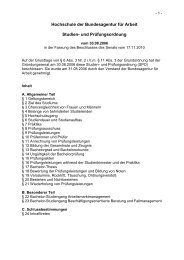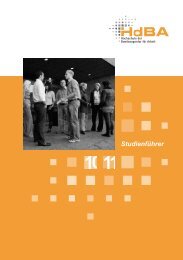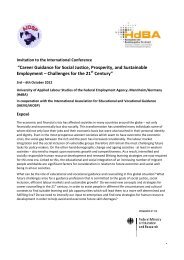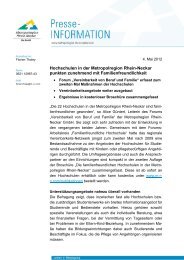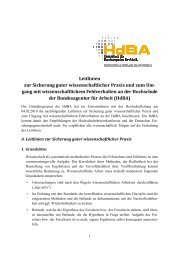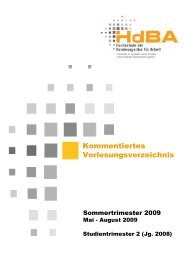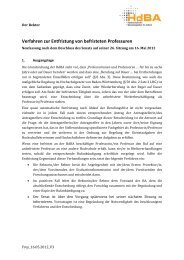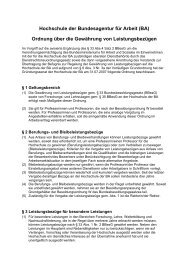Brain Drain - Hochschule der Bundesagentur für Arbeit
Brain Drain - Hochschule der Bundesagentur für Arbeit
Brain Drain - Hochschule der Bundesagentur für Arbeit
You also want an ePaper? Increase the reach of your titles
YUMPU automatically turns print PDFs into web optimized ePapers that Google loves.
��������������������������������������������������<br />
���������������������������������������������������������������������������<br />
�<br />
�<br />
History and Organsational structure:<br />
1993 the EURES Network (EURopean Employment Services) was founded by the<br />
European Commission, GD 5 „Employment and Social Affairs. It shall be a<br />
cooperating network of the Public Employment Services, their partners (i.e.<br />
employers’ and employees’ organisations and the European Commission).<br />
The EURES network was created to link and mobilize the public employment<br />
services of the Member States of the E.U., the European Free-Trade Zone, as well<br />
as all those who deal with employment on a national and international level.<br />
The General Directorate (DG) for Employment and Social Affairs is the coordinator of<br />
the network.<br />
EURES has a human network of more than 700 EURES advisers that are in daily<br />
contact with jobseeker and employers across Europe.<br />
In European cross-bor<strong>der</strong> regions, EURES has an important role to play in providing<br />
information about and helping to solve all sorts of problems related to cross-bor<strong>der</strong><br />
commuting that workers and employers may experience.<br />
Set up in 1993, EURES is a co-operation network between the European<br />
Commission and the Public Employment Services of the EEA Member States (The<br />
EU countries plus Norway, Iceland and Liechtenstein) and other partner<br />
organizations. Switzerland also takes part in EURES co-operation. The joint<br />
resources of the EURES member and partner organizations provide a solid basis for<br />
the EURES network to offer high quality services for both workers and employers.<br />
EURES advisers are trained specialists who provide the three basic EURES services<br />
of information, guidance and placement, to both jobseekers and employers interested<br />
in the European job market. They have developed specialised expertise in the<br />
practical, legal and administrative matters relating to mobility at national and crossbor<strong>der</strong><br />
levels. They work within the Public Employment Service of each member<br />
country, or within other partner organisations in the EURES network.<br />
EURES has a particularly important role to play in cross-bor<strong>der</strong> regions, areas in<br />
which there are significant levels of cross-bor<strong>der</strong> commuting. The more than 600 000<br />
people who live in one EU country and work in another have to cope with different<br />
national practices and legal systems. They may come across administrative, legal or<br />
fiscal obstacles to mobility on a daily basis.<br />
EURES advisers in these areas provide specific advice and guidance on the rights<br />
and obligations of workers living in one country and working in another.<br />
There are currently over 20 EURES cross-bor<strong>der</strong> partnerships, spread geographically<br />
throughout Europe and involving more than 13 countries. Aiming to meet the need for<br />
information and coordination connected with mobility in the bor<strong>der</strong> regions, these<br />
partnerships bring together public employment and vocational training services,<br />
employers and trades union organisations, local authorities and other institutions<br />
189






